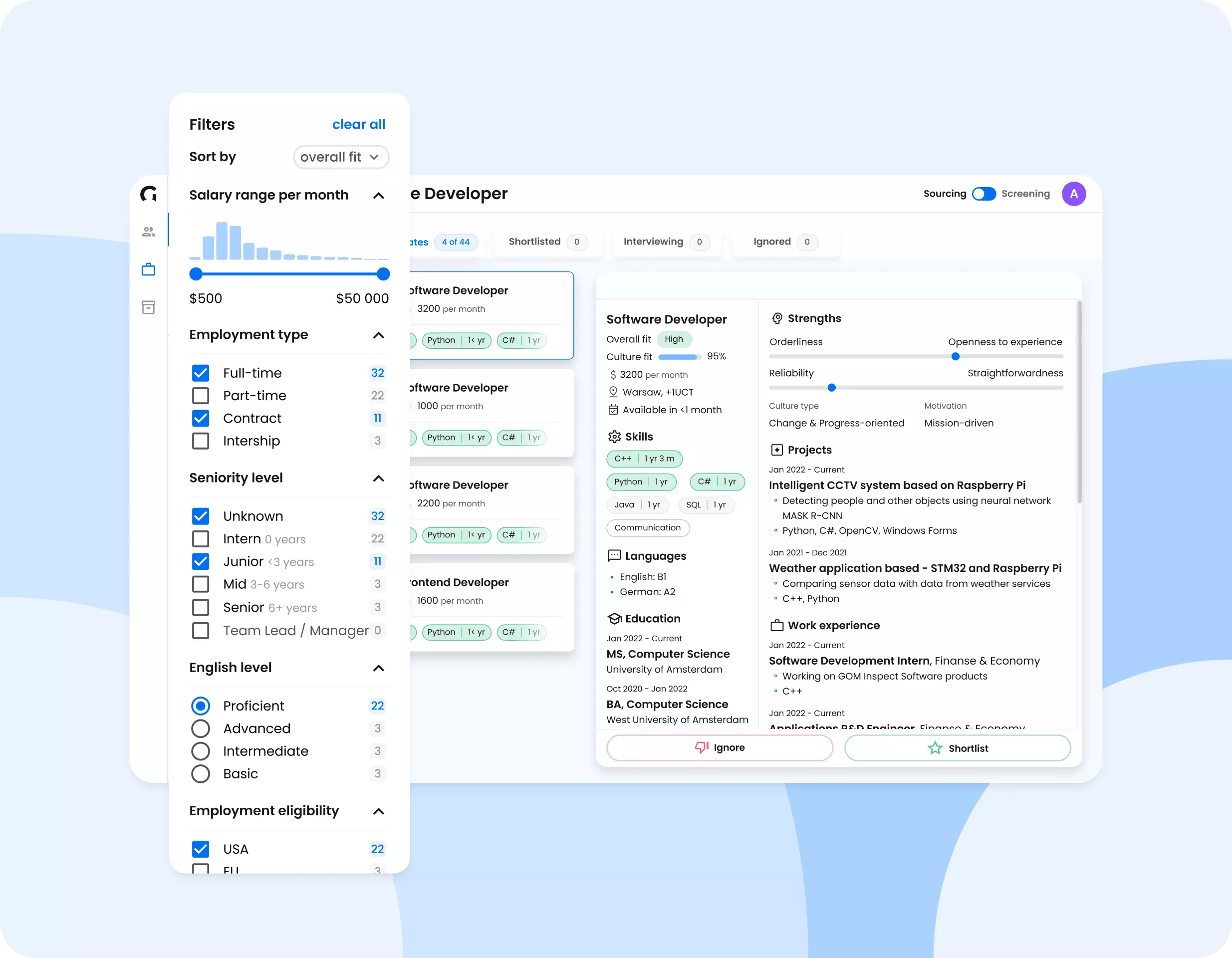Candidate and Workplace Assessments
Free and Premium Candidate Assessment Tools
Used by teams inside growth startups and brands in the US & Europe
Science-backed Candidate Assessments

Pre-screened applicants
Role fit plus Culture fit
Candidate ranking
We don’t test. We match.
How is Gyfted better?
Best Candidate Assessment Tools
Automated talent assessment
Access Candidate Assessment Tools
Talent Management Software Reviews
HR Software Reviews
Recruitment Agencies Reviews
Frequently asked questions
How do you measure talent?
Measuring talent is a complex and nuanced process, because talent comes in many different forms. Some individuals excel in creative pursuits such as music, art or writing, while others may have exceptional analytical or problem-solving abilities. Hence it's important to take into account the unique strengths and weaknesses of each individual.
One way to measure talent is to assess an individual's performance in their chosen field. Another approach to measuring talent is to evaluate an individual's potential for growth and development. This can involve assessing their ability to learn new skills, adapt to new environments, and innovate. We believe that the measure of intelligence is the ability to change, that’s why we’re very keen on measuring learning agility in candidates. This approach may be particularly useful when evaluating individuals who are early in their careers, are changing careers, and work in collaborative team environments.
Ultimately, measuring talent requires a combination of objective and subjective assessments, as well as a deep understanding of the individual being evaluated. It's important to approach talent evaluation recognizing that each individual has their own unique talents and potential. By taking a holistic and personalized approach to talent evaluation, we can help individuals reach their full potential and achieve their goals.
How can a company assess person-job fit before hiring employees?
- Provide clear job descriptions: detailed and accurate job descriptions that outline the required skills, experience, and personal attributes. This helps candidates understand the role's demands and self-assess their suitability.
- Customized application forms: application forms with targeted questions to gauge candidates' abilities, values, and preferences relevant to the role.
- Skill and aptitude tests: use tests that evaluate specific skills or aptitudes necessary for the job, such as technical, analytical, or communication abilities.
- Behavioral and situational interviews: use interview techniques to assess candidates' past experiences and hypothetical scenarios, helping you understand how they would handle job-related challenges.
- Personality and values assessments: utilize validated assessment tools to measure candidates' personality traits, values, and preferences, ensuring alignment with the company culture and job requirements.
- Reference checks: obtain insights into candidates' past performance, work style, and compatibility with the role from their colleagues or former managers.
- Trial period or internships: offer candidates a temporary trial period or internship, allowing both the company and the candidate to evaluate person-job fit in a real work setting.
How to assess job fit?
- Analyze the job description
- Self-reflection on what you’re truly seeking and enjoy and are good at
- Research the company/sector
- Compare skills and experience vs requirements obviously
- Evaluate work style compatibility vs the team and role
- Assess your growth potential in such a role
- Job simulations or informational interviews with current/past staff
What is a job fit assessment?
How to evaluate candidates?
Use a job fit assessment test to save time and evaluate applicants properly for cognitive ability, personality and culture fit all at once. To evaluate candidates effectively, start by defining the specific qualifications and characteristics that are needed for the position. This may include technical skills, experience, and personal qualities. Once these criteria have been established, approach each candidate with an open mind and a willingness to learn about their unique strengths and experiences.
Candidates may be nervous or anxious during the interview process, and it's important to create a supportive and welcoming environment that allows them to showcase their talents and abilities to the best of their abilities. When evaluating candidates, it's important to focus on their technical abilities and their personal qualities. This can involve assessing their ability to work collaboratively with others, their level of self-awareness and emotional intelligence, and their cognitive ability, as well as culture fit to ensure they don’t turn over upon joining.